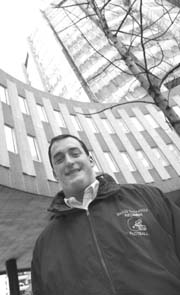
Jean-Philippe Darche: Happy when he's hitting
Jean-Philippe Darche is, by most accounts, exactly the sort of fellow you would like to see become a doctor. The second-year medical student is caring, diligent, hard-working -- and he doesn't take himself too seriously. There is one aspect to his life that is most undoctorlike, however. Darche takes pleasure in -- and is exceedingly good at -- hitting other grown men so hard that they don't just see stars, they glimpse entire constellations.
Of course Darche's activities are entirely legal. He has been a stand-out middle linebacker for several seasons with the McGill Redmen football team and he restricts his hits to the playing field. Still, a doctor-to-be playing football raises some eyebrows. "I hurt people and then I fix them up after," jokes Darche.
Darche is currently contending with conflicting feelings about his football career. In one respect, he's a little depressed -- after playing for five seasons, Darche is no longer eligible to continue to suit up for the Redmen.
On the other hand, Darche has cause to celebrate. He was recently named the winner of the Russ Jackson Trophy, a national prize that goes to the Canadian university football player who best exemplifies excellence in academic achievement, community service and outstanding play. Remarkably, he is the third McGill Redman to earn the trophy this decade -- J.P. Veri and Steve Papp, ex-Redmen who are also pursuing medical careers, won the prize in 1990 and 1994 respectively.
Darche doesn't think it's a fluke that McGill players have fared so well in winning the Jackson Trophy. "Coach [Charlie] Baillie and the assistant coaches really push us, not just to be good football players, but to be good men. They encourage us to study hard; there are a lot of Redmen players who end up being named Academic All-Canadians. You need at least a 3.5 grade point average for that."
One of those Academic All-Canadians is Darche himself who's managed the feat on four occasions. As far as community service goes, he has been a volunteer science judge at Selwyn House, organized a team trip to visit children at the Shriner's Hospital, raised funds for the Montreal Children's Hospital and visited with geriatric patients at the Montreal General Hospital.
He's also recognized for his outstanding play: he was recently named to the national university football all-star team. Charlie Baillie calls Darche "the best linebacker to play for me in 27 years." This season, Darche set a new McGill record for career tackles with 313, 17 of which he managed in a single game last year, setting another Redmen record.
Darche has played football since high school and says he has a passion for the sport. As McGill's middle linebacker, he was the Redmen's defensive leader, calling the signals for his teammates.
"It's the best job in football," claims Darche. "You can't hide on the field. You're right in the middle of all the action. You have to be concentrating all the time on what the other team is going to do and you have to be able to react right away."
"His size, strength and quickness allow him to defensively dominate the entire field from sideline to sideline. In addition, his leadership abilities, mental toughness and intensity all combine to make him a great linebacker," says Baillie.
Balancing school and football is no easy task. Darche says Redmen players are busy between 5 pm and 10 pm most weeknights in practices and team meetings during the football season. Add an extra few hours for the games they play on Saturdays, and each Redmen player easily spends 30 hours a week on football. "I still live at home with my parents," says the St. Laurent native. "My mom does the cooking and cleaning. That helps a lot."
You would think that now that he is free from football, Darche will have more energy for his studies, but he worries that his marks might actually suffer now that his playing days are over. "If I'm just going to school, it makes me crazy. I'm actually less productive when I have more time on my hands. I'm used to dealing with stress, fighting to find the time to get my studies done. I work well under pressure."
Darche should have enough on his plate to keep him busy for the foreseeable future. Come January, his studies will move to a teaching hospital where he will learn about examining and interviewing patients. And he has a July wedding to plan with his fiancée, a volleyball player at the Université de Montréal.
Daniel McCabe
| 


